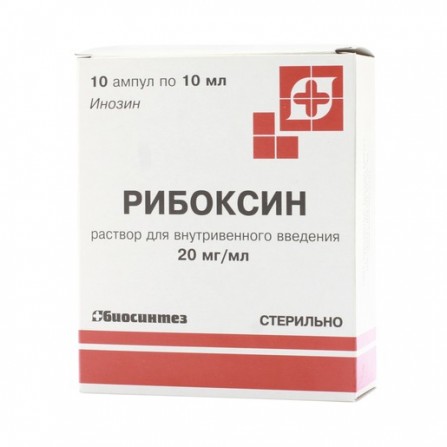Riboxin injection solution ampoules 2% 10ml N10
Condition: New product
996 Items
Rating:
Be the first to write a review!

More info
Active ingredients
Inosine
Composition
1 ml of solution (1 ampoule) contains: Active ingredient: inosine 20 mg (200 mg).
Pharmacological effect
Purine nucleoside, the precursor of ATP. It improves myocardial metabolism, has antihypoxic and antiarrhythmic effect. Increases the energy balance of the myocardium. It has a protective effect on the kidneys in conditions of ischemia during the operation. Participates in the exchange of glucose, increases the activity of a number of enzymes of the Krebs cycle. Stimulates nucleotide synthesis.
Pharmacokinetics
Inosine is well absorbed from the gastrointestinal tract. Metabolized in the liver with the formation of glucuronic acid and its subsequent oxidation. In small quantities excreted by the kidneys.
Indications
Comprehensive treatment of coronary artery disease (condition after myocardial infarction, stenocardia), cardiac rhythm disturbance, intoxication with cardiac glycosides preparations, treatment of cardiomyopathies of various genesis, myocardiodystrophy (against the background of heavy physical exertion, infectious and endocrine genesis), myocarditis, liver diseases (hepatitis, cirrhosis, infectious and endocrine genesis), myocarditis, liver diseases (hepatitis, cirrhosis, infectious and endocrine genesis), myocarditis, liver diseases fatty degeneration of the liver), urokoproporfiriya. prevention of leukopenia during irradiation. To improve visual function in open-angle glaucoma with normalized intraocular pressure.
Contraindications
Hypersensitivity to the drug. Gout, hyperuricemia. Restriction to taking the drug renal failure.
Use during pregnancy and lactation
Caution is prescribed inosine for renal dysfunction.
Dosage and administration
Tablets: inside to food. The daily dose for adults and children over the age of 12 is set individually and is 0.6–2.4 g / day. Usually at the beginning of treatment, the drug is prescribed in a daily dose of 0.6–0.8 g (1 tablet 3-4 times a day). If the drug is well tolerated, gradually increase the dose (within 2–3 days) to 1.2 g / day (2 pills 3 times a day), then 2.4 g per day (4 pills 3 times per day). With lesson prophylaxis, Riboxin is prescribed at 0.8 g / day (1 tablet 4 times a day). Duration of treatment is 1-3 months. Solution for injection. Apply in / in drip or jet. At first, 200 mg (10 ml of 2% p-ra) are administered once a day, then, with good tolerance, up to 400 mg (20 ml of 2% p-ra) 1-2 times a day. The course of treatment is determined individually (on average 10-15 days).With a drop-in / in the introduction of a 2% solution of the drug diluted in 5% solution of glucose or 0.9% solution of sodium chloride (up to 250 ml). The drug is injected slowly, at a rate of 40–60 drops per minute. In acute disorders of the rhythm of the heart, jet administration is possible in a single dose of 200–400 mg (10–20 ml of 2% p-ra).
Side effects
Patients with hypersensitivity to the drug may experience itching, skin flushing, rashes, and urticaria. From the side of cardiovascular system arterial hypotension, tachycardia are possible. Possible manifestation of various local reactions, general weakness. Rarely, during treatment, there may be an increase in the level of urea in the blood, with prolonged treatment - exacerbation of gout. In the event of adverse reactions, the drug should be canceled.
special instructions
Caution is prescribed inosine for renal dysfunction. If itching and flushing of the skin, inosine should be canceled.




